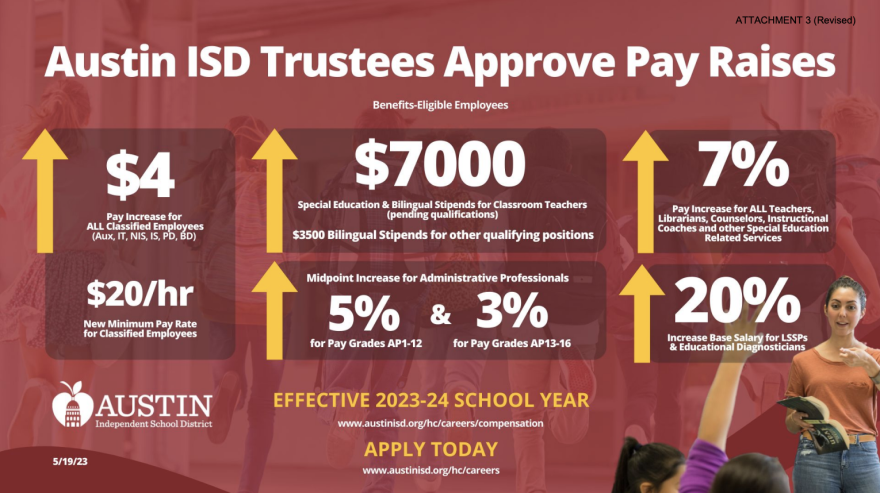The Austin ISD school board has adopted a deficit budget for the next fiscal year, which starts July 1. The vote happened a little before 1 a.m. Friday.
The deficit was not a surprise. Back in May, the board approved significant salary increases for AISD employees. The compensation package requires the district to spend up to $52.25 million of its reserve funds to cover the cost. Interim Superintendent Matias Segura said the budget reflects the district's values.
"When we started this process, we acknowledged that there were a lot of needs within our community and within our schools, but certainly limited resources," he said. "But early on in the process we identified compensation, we identified the need to support and invest in our staff as one of the highest priorities."
While the school board adopted a deficit budget, AISD also has to give nearly $1 billion to the state during the next fiscal year because of Texas' recapture system. That system takes what the state considers excess revenue from property wealthy districts and distributes it to districts that can not raise as much money through property taxes.
Austin ISD would have more money for its budget as well as a smaller recapture payment if the Texas Legislature had raised funding for students this year. The school board and district officials hoped state lawmakers would increase the minimum amount of money the state must spend per student, which is known as the basic allotment. This number has stayed at $6,160 since 2019, despite inflation. But legislation to slightly raise per student funding was derailed by a debate over school vouchers.
Trustee Lynn Boswell said she was frustrated that lawmakers did not increase the basic allotment, putting districts in the position to make cuts.
"I am angry," she said. "I know there are many, many, many other things that we know we could invest in to make a meaningful difference for our students academically."
The district's Chief Financial Officer Ed Ramos told the board that Austin ISD is not the only district facing financial challenges.
"Many districts throughout the state will be passing deficit budgets, because they are facing the same challenges," he said. "Teachers are leaving the profession. Employees are making the decision whether or not to stay in their districts."
Ramos said the district does have budget reduction strategies, such as increasing student enrollment, eliminating vacant positions and maximizing Title 1 funding for campuses with high percentages of students from low-income families.
Ramos also expects the district to be able to save money with the help of the 2022 bond package voters overwhelmingly approved last fall.
"We have funds set aside for purchase of HVAC equipment and other equipment so what that would help our operating budget with is that we would not have to rent high-dollar equipment," he said.
Ramos added that the district will likely face more hard choices in the years ahead to get back to a balanced budget. The budget the school board adopted for the current fiscal year was balanced, but the salary increases were minimal.
Staff salaries make up the lion’s share of the budget
Employee salaries account for most of any school district’s budget. That figure has been 87% in Austin ISD's last couple of budgets and remains the same in the new one. The compensation package that trustees approved last month includes 7% raises for teachers, counselors, librarians and instructional coaches.
Hourly employees will get a $4 raise, increasing the minimum pay rate for classified employees to $20 per hour. Ramos said the affect of that raise will be widespread.
"Over 2,100 employees in this district ... were below that $20-an-hour rate, so that's a huge benefit to many of our employees," he said.

Boswell said spending more on compensation already appears to be paying off. As of this week, Austin ISD had approximately 80 teacher vacancies. This time last year, there were more than 1,000 teacher vacancies.
"I am thrilled to see that paying off already, and that will have a direct impact on our students," she said.
The district is also investing in special education positions to address its years-long backlog of evaluations. Licensed Specialists in School Psychology and Educational Diagnosticians, who can evaluate students for disabilities, will see a 20% increase in their base salaries. Special education classroom teachers are eligible for a $7,000 bonus.
Austin ISD has been facing a federal lawsuit over the backlog, and earlier this year, the Texas Education Agency announced plans to install a management team to oversee the district’s special ed department. AISD appealed the proposed special education conservatorship, but TEA has not yet announced a decision.
Despite AISD's investment in a range of positions, members of the school board expressed concern about plans to delay hiring six athletic trainers for 5A high schools, or campuses with between 1,300 and 2,224 students, to help reduce the budget deficit. Trustee Andrew Gonzales, used to be a teacher at Travis Early College High School.
"I was on a high school campus and [athletic trainers] had transformative relationships with students that really affected academics," he said.
Trustee Ofelia Zapata said she would rather see the funding for some administrative staff raises go to hiring trainers in time for the fall. After some discussion, Zapata motioned to approve the budget with the administrative raises as well as funding for the athletic trainer positions. The cost of the six athletic trainer positions totals about $500,000. Her motion was successful. The recapture payment
Austin ISD sends a lot of money to the state’s recapture system — more than any other school district in Texas. The system is also known as "Robin Hood."
In a nutshell, under the recapture system, the state takes money from property wealthy districts and distributes it to property poor districts.
To figure out how much a property wealthy district owes, the state determines how much funding the district needs to operate based on a variety of factors. Those factors include the overall number of students as well as how many students are low-income or receive special education services. If a district’s local property tax revenue exceeds what the state says that district needs to operate, those excess dollars are recaptured, or collected by the state.

More and more districts in Central Texas are paying into the recapture system as property values in the region rise. And when a district has high property values and declining student enrollment, like Austin ISD, that's a recipe for one hefty recapture payment. In fact, more than 50% of the district’s local property tax revenue is subject to recapture.
Austin ISD expects to send nearly $941 million of its $1.8 billion general fund to the state’s recapture system. That is up nearly $100 million from the district’s recapture payment for the current fiscal year.
Ramos said Austin ISD's property tax rate is projected to be $0.9266 per $100 taxable valuation. That is down from the current tax rate of $0.9966. The tax rate will be adopted in September, or 30 or 60 days after property appraisals are certified.
There is also a chance the AISD budget will need to be amended depending on any action the Texas Legislature may take during a special session.













